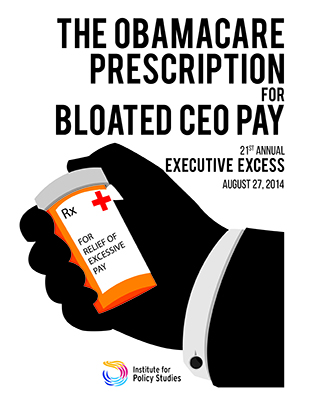 To combat profiteering in the health care sector, the Affordable Care Act imposes strict limits on the tax deductibility of health insurer executive pay. The Institute for Policy Studies is the first to analyze the impact of these new rules. Based on data for the 10 largest health insurers, we found that this virtually unknown Obamacare provision saved American taxpayers tens of millions of dollars in 2013. Key findings:
To combat profiteering in the health care sector, the Affordable Care Act imposes strict limits on the tax deductibility of health insurer executive pay. The Institute for Policy Studies is the first to analyze the impact of these new rules. Based on data for the 10 largest health insurers, we found that this virtually unknown Obamacare provision saved American taxpayers tens of millions of dollars in 2013. Key findings:
Obamacare reduced taxpayer subsidies for executive pay
Under the current federal tax code, the more corporations pay their top executives, the less they pay Uncle Sam. The 2010 Affordable Care Act — “Obamacare” — took an important step towards ending this perverse subsidy. Obamacare imposed a strict $500,000 limit on the tax deductibility of health insurance executive pay, starting in 2013.
- The new deductibility limits generated at least $72 million in additional public revenue last year from America’s 10 largest publicly held health insurance companies.
- This $72 million in savings from limiting pay-related deductions for just 57 executives is the equivalent of the cost of dental insurance for 262,000 Americans or the average annual health insurance plan deductible for 28,000 people.
- One major American health insurer, WellPoint, lowered its 2013 corporate tax bill by more than $1.5 million by accelerating the vesting of executive stock awards, a maneuver that made these awards taxable on December 10, 2012, just days before the Obamacare deductibility reform took effect. Meanwhile, thanks largely to the Affordable Care Act, WellPoint has gained 1.6 million new customers since last year.
- Health insurer executive pay levels did not decline in 2013, but the share of executive compensation that top health insurers could claim as deductible dropped from 96 percent in 2012 to 27 percent. On average, these 10 corporations owed an extra $1.3 million in taxes per executive.
More taxpayer savings to come
- The $72 million tax increase for the top 10 health insurers last year reflects only a small share of the benefits to average taxpayers. One reason: Most health insurer executive stock options exercised in 2013 were exempted from the new deductibility limits because they pre-dated Obamacare. In the future, the benefits from deductibility reform for average taxpayers will be even greater.
- There is growing support in the U.S. Congress to apply the Obamacare executive pay provision to all major U.S. corporations. This would save taxpayers $50 billion over the next 10 years while encouraging more reasonable executive pay levels.
This year’s IPS Executive Excess report, the 21st annual, also includes an updated scorecard that rates recent pay CEO pay reforms now in place, as well as other reforms pending in Congress and a few promising initiatives not yet on the congressional table.
